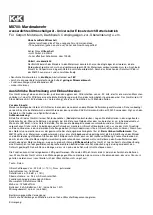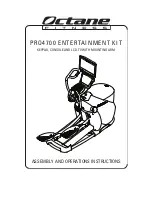
Follow DDU-2000 Series AED Instructions
At this point, the DDU-2000 Series AED will check to make sure that the pads are well connected to the patient and that
an adequate ECG signal is being received. Do not touch the patient. Eliminate any patient movement, and cease CPR
at this time.
If there is a problem with the pad connection, socket connection, patient motion, or other interference, the AED will
guide the operator with both audible and displayed instructions. Text prompts are identical to or are an abbreviated form
of the audio prompts. Video prompts reinforce the audio and text prompts and aid in high ambient noise environments.
4.3 Heart Rhythm Analysis
Once the DDU-2000 Series AED has determined that the pads are making a good connection to the patient, the
AED will start the ECG rhythm analysis. The unit analyzes the ECG signal and determines whether a shockable or
non-shockable rhythm is present. While analyzing, the AED will continue to monitor signal and pad conditions and
will reassess analysis and prompt the user if additional user action is needed.
4.4 Delivering The Shock
If the DDU-2000 Series AED ECG analysis algorithm has determined that a shock is required, the unit will automatically
charge in preparation for shock delivery. While the AED charges, the unit may emit a charging tone and will continue
to analyze the patient’s heart rhythm. If the unit detects that the heart rhythm has changed to one that does not
require a shock, the unit will prompt the user to begin CPR. While analyzing, the AED will continue to monitor signal
and pad conditions.
If the unit has determined that a shock is required and has completed charging, the SHOCK button will flash and the
user will be instructed to press the flashing SHOCK button. The user should follow the AED instructions and press
the SHOCK button.
Important
: The DDU-2000 Series AED will not automatically deliver a shock — the user must press the flashing
SHOCK button. If while waiting for the SHOCK button to be pressed, the unit detects a rhythm change to a non-
shockable rhythm, the unit will cancel the shock. Also, if the SHOCK button is not pressed within 30 seconds of the
initial “press flashing SHOCK button” prompt, the unit will automatically cancel the shock.
The user can abort charging or shock delivery at any time by pressing and holding the ON/OFF button for approximately
two seconds to turn the unit off.
4.5 CPR Period
The operator will be prompted to begin CPR. The unit will not monitor the patient’s ECG rhythm during the CPR period.
During the CPR period, the AED will not advise the user to “stop motion” even if motion is present.
The user should follow the AED instructions during this time. Once the CPR period is complete, the unit will continue in
Heart Rhythm Analysis mode.
CPR coaching is provided through a series of voice and visual prompts and audible tones. The factory default setting
provides prompts for chest compressions only (no breathing).
However, breathing prompts can be enabled/disabled by pressing the softkey button next to the Rescue Breathing
Options icon displayed on the screen during rescue. (Refer to the “Rescue Breathing Options Softkey Icon” section
below.) Breathing prompts can also be enabled/disabled by setting the menu option in Maintenance Mode. (Refer to the
“
” section in Chapter 8 of this manual.)
Rescue Breathing Options Softkey Icon
: During a rescue, when this icon is present on the
screen, the user may press the corresponding softkey button to select CPR coaching with
compressions only (no breathing) or CPR coaching with compressions and breathing.
Note
: Refer to the “
” section in Chapter 8 of this manual for instructions on how
to change the factory default setting.
When this
Information Softkey Icon
is present on the screen, the user may
press the corresponding softkey button for additional information with video
instruction. To exit, press the softkey button again.
4.
Using
The
DDU-20
0
0
S
eries in
AED Mode
22
DAC-E2510EN-BA
















































